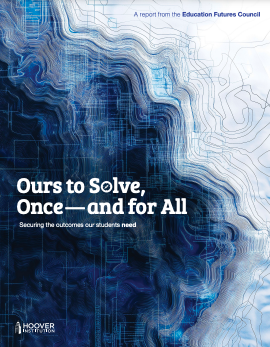A year after it was convened by the Hoover Institution, the Education Futures Council released its first report Tuesday, issuing an urgent call for a new national framework to renew America’s schools and expressing the unanimous concern that taking dramatic action to revitalize today’s K-12 educational system “is no longer a matter of public urgency; it is a matter of public emergency.”
In a signed letter attached to today’s “Ours to Solve, Once — and For All” report, the six-member council (Jean-Claude Brizard, Mitch Daniels, Chris Howard, Andrew Luck, Frances Messano and Condoleezza Rice) writes that it identified “fundamental barriers” to student equity and success within the current school system. “Despite our national commitment to the issue, steep increases in funding, and decades of reform efforts, our current system has been unable to offset poor student outcomes – particularly for minority and low-income students,” the introduction to the report says. “This failure goes against who we profess to be as a nation.”
Hoover Institution Director and Council Co-Chair Condoleezza Rice went a step further in a Tuesday statement, framing the issue through the lens of national stability: “Education excellence is critical to the societal contract supporting our democracy and is inextricably tied to the success — or failure — of our nation.”

Today’s report is unique in its focus on broader, system-level reforms. The council criticizes the existing structure of the nation’s education landscape, noting that the local school boards and state and federal agencies that run today’s schools “are not the product of coherent and thoughtful design. Rather, they evolved over decades to a point where they hinder more than help the cause of improved outcomes for all students.”
The group also highlights the “perplexing contradiction” of today’s public schools, where the current system boasts strong community support, superior research and dedicated teachers and staff, but students’ academic outcomes vary widely — and many of these results are underwhelming.
“According to virtually every available metric, the overall quality of American schools has either declined or remained stagnant since the 1970s,” the council writes.
On a per-student basis, the U.S. spends 40% more than the average spent by member countries of the Organisation for Economic Cooperation and Development (OECD), the council notes. At the same time, the U.S ranks 34th in math globally on the OECD Programme for International Student Assessment (PISA) evaluations.
“Changing the way these institutions are organized and function ― what we call the ‘operating system’ of public education ― will raise trust, respect, agency, and empowerment for teachers and principals and will provide essential support from other education leaders,” the group says in the report.
“In the flipped system hierarchy, schools are the apex organization”Education Futures Council
The council recommends four core commitments that they believe will help improve the educational “operating system”: Re-organizing the current system toward a new “true north” that focuses on student outcomes; minimizing regulations and mandates in favor of embracing incentives; cultivating and rewarding professional mastery in the education workforce; and flipping the system “from top-down to bottom-up.”
“In the flipped system hierarchy, schools are the apex organization,” writes the council. “They need sufficient discretion to make decisions in situ to manage their own operations and to adapt their efforts to address the needs of their students.”
A Hoover Institution spokesperson said that a dedicated website will accompany the report. Set to launch next month, the hub will offer readers and policymakers additional resources and details.
A summit is also being scheduled for January at Stanford University, which will aim to bring experts together from across the country to discuss and debate the findings of the report.
“We hope this report builds motivation and commitment for change,” the council members write in their introduction. “Together, we can launch a new approach to address the current state of public education in America, and provide every child the foundational opportunities they deserve.”
